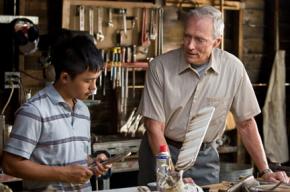Is Gran Torino really an Edsel?
explains why Clint Eastwood's Gran Torino falls short in confronting racial prejudice.
CLINT EASTWOOD'S Gran Torino is a confused attempt to come to grips with America's changing ethnic landscape.
Eastwood plays Walt Kowalski, an irascible, old Korean War hero who is estranged from his family. The movie, set in present-day Michigan, loosely revolves around Kowalski 's car, a Gran Torino, which Eastwood's character assembled himself at a Ford plant. The car represents a bygone era; long forgotten is the social contract under which Ford's workers could buy the automobiles they manufactured.
In this movie, the auto industry has disappeared, and Kowalski's deteriorating neighborhood has been overrun by Asian gangs and racial minorities. It is up to Kowalski, in Dirty Harry fashion, to sort out the good from the bad.
Kowalski is an avowed racist, and the main conflict is his confrontation with a local Asian gang. At the level of character development, Gran Torino appears to be a story about racial reconciliation. Initially, Eastwood's character literally growls racial slurs--and sometimes just growls--to express his distaste for the ethnic minorities that move in next door to his immaculately kept suburban home.

Eventually, Kowalski is won over by Thao, a Hmong boy who lives next door. This is despite that fact that Thao, played by newcomer Bee Vang, tried to steal Kowalski 's car as part of a local gang's initiation rite. To symbolize his conversion, Kowalski's racial slurs take on an affectionate tone as he develops a friendship with Thao's outspoken sister Sue (Ahney Her).
Throughout the course of the movie, Kowalski becomes a kind of father figure to Thao and a friend to Sue. Eastwood's character reveals his vulnerability, in part by coughing up blood throughout the movie as a result of a lifelong smoking habit. More significant is his realization that the blue-collar, xenophobic ideals by which he has lived--retiring from an auto plant, fixing his own car and appliances, and always buying American--have left him lonely and isolated.
His austere manner prohibits him from being able to relate to either his kids or his grandchildren. After having a pleasant lunch at his Asian neighbors' home, Kowalski realizes half in dismay, half jokingly, "I've got more in common with these gooks then I do with my own spoiled, rotten family."
Yet for other reasons, the movie is problematic. Reviews of the film fail to look past Eastwood's mesmerizing screen presence or the fact that he'll likely win an Oscar for Best Actor. Kowalski is something like an avenger, and at 78 years old, Eastwood is still as convincing as ever. However, Kowalski's enemies are one-dimensional, caricatured racial minorities.
The Black teenagers on the street corner who harass Sue are portrayed as animals. One young Black man menacingly tells Sue's dorky white boyfriend, "Man, I will bite your f-ing face off," before thrusting his crotch at Sue. At this point, Kowalski emerges from his car to save the day in heroic fashion, producing a "go ahead, make my day" moment. No other Black actor appears in the film.
Despite being widely praised, Gran Torino relies on a simplistic narrative which, drawing on the ideas of the writer Mahmood Mamdani, could be summed up as the "good Asian, bad Asian" scenario. In this film, the Asian gangbanger villains are mindless, incestuous rapists. The only explanation for this is offered by Sue, who, speaking of the Hmong, explains, "The girls go to college, and the boys go jail."
When one of his Hmong neighbors is brutally affronted by the Hmong gang, Kowalski sets out for revenge. If one substitutes the word "Muslim" for "Asian," it can be seen that, similar to the so-called war on terror, the "good" Asians are in conflict with the "bad" Asians. The United States, represented by Kowalski, can't just stand by, but must side with the "good" Asians to help them declare their allegiance to America.
More complex is the fact that Eastwood's character is plagued by his war experience. He is overcome with guilt for killing "13, maybe more" people in Korea, including, "shooting a Korean boy right in the face, when all he wanted to do was give up," adding that not a day goes by in which he doesn't think about it. At the end of the movie, Kowalski discards his war medal.
Yet the resolution of the film is also problematic. Upon the conclusion of the movie, all that is clear is that vigilante justice no longer functions as it once did. However, everyone watching the movie, for the sake of the victim whom Eastwood sets out to defend, probably wishes that it did.
The movie's Web site claims that this is the story of Kowalski confronting his own racial prejudice, yet this is limited by the larger framework in which Eastwood's character must split off the evil Asian bad guys from those ready to peacefully coexist. No larger explanation is ever attempted, even in passing, for the apparently sorry state of inner city youth and gang violence.


